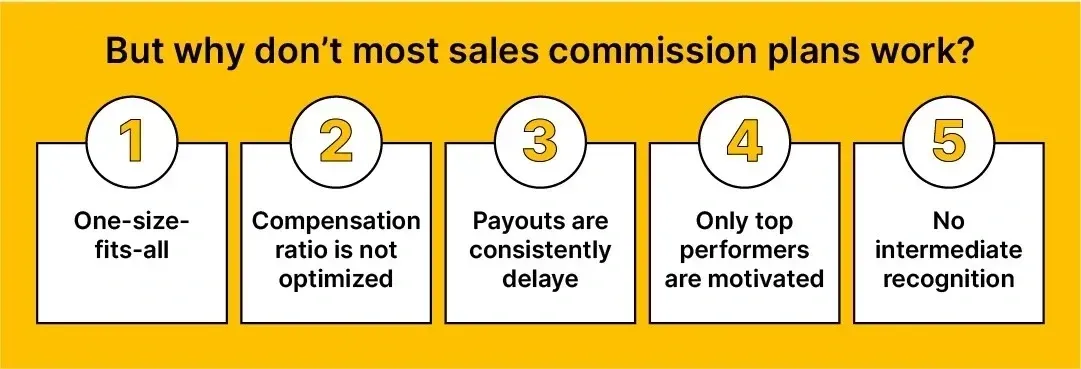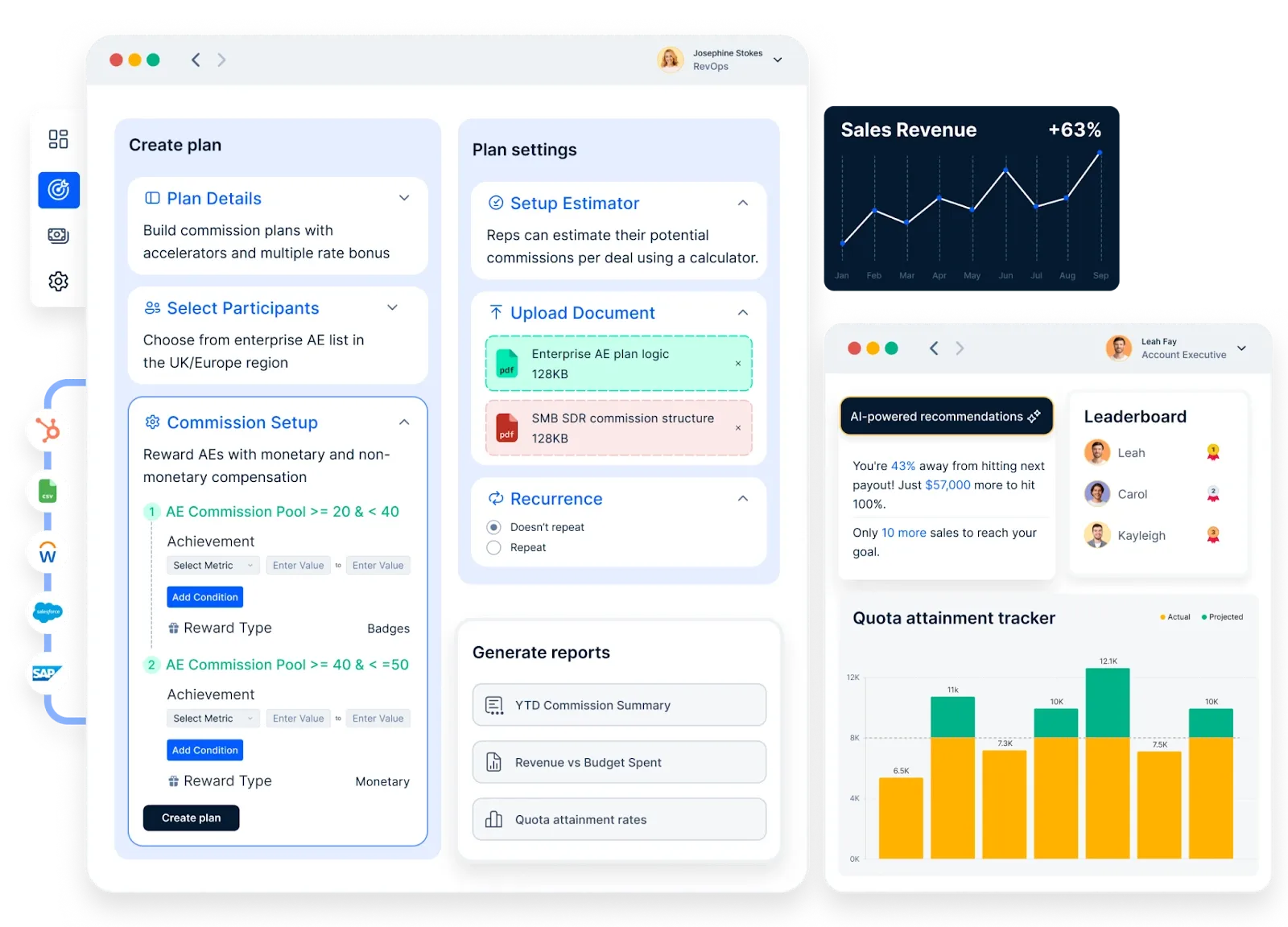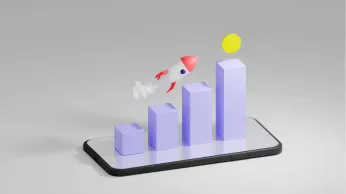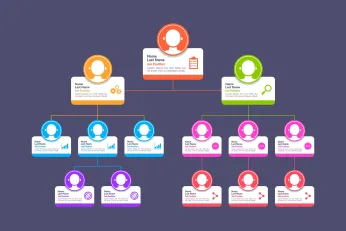I piani di provvigione e di incentivazione essenziali che dovete sapere come usare per il successo nelle vendite usando Compass
La progettazione di un programma di formazione alle vendite di successo è un processo complesso, ma può dare grandi frutti al vostro team. Compass può aiutarvi, con il potere della gamification.
In questa pagina
Keeping your sales team motivated is no small feat. While many assume sales reps are only driven by money, the reality is that they, like all employees, seek purpose, recognition, and fairness in their work.
A well-designed sales incentive plan is one of the most powerful tools to inspire performance, retain top talent, and drive business growth.
However, many companies struggle with ineffective incentive structures. Outdated processes, unclear rewards, and demotivating systems can lead to disengagement, turnover, and missed revenue opportunities.
In this guide, we’ll explore the essential building blocks of a successful sales incentive plan that your sales reps will love—and how Compass can help you simplify and optimize the process.
Why incentivize and compensate the salespeople?
Salespeople were paid by incentives for centuries before economists began writing about the principal-agent problem. Companies chose this system for at least three reasons. First, it’s easy to measure the short-term output of a salesperson.
Second, sales reps have traditionally worked with little supervision since incentive-based pay gives managers some control, making up for their inability to know if a rep is actually working or playing golf. Third, studies of personality type show that salespeople typically have a larger appetite for risk than other workers, so a pay plan that incentivizes this appeals to them.
But why don’t most sales commission plans work?

Many sales commission plans fail to deliver the desired results due to common pitfalls. Here are five reasons why:
- One-size-fits-all approach – Every sales team is different, yet many companies use the same commission structure for all sales reps. A customized plan tailored to different roles and goals leads to better performance.
- Compensation ratio is not optimized – If the balance between fixed salary and commission isn’t right, it can either demotivate sales reps or lead to unhealthy competition. Sales commission plans must be structured to encourage sustainable success.
- Payouts are consistently delayed – Timely commission payouts are crucial for keeping sales reps engaged. When payments are delayed, motivation drops, and trust in the system erodes.
- Only top performers are motivated – Many sales commissions plans only reward high achievers, leaving mid-level performers disengaged. A well-designed plan should incentivize all levels of sales reps to drive overall team success.
- No intermediate recognition – Small wins matter. Without intermediate rewards, sales reps may lose momentum before reaching big targets. Recognizing progress along the way keeps motivation high.
A well-structured sales commission plan ensures fairness, clarity, and motivation, ultimately driving better sales results.
Beyond a basic salary, organizations must explore additional ways to motivate their sales teams. Instead of relying solely on motivational speeches, implementing a structured incentive program can drive performance, enhance engagement, and align sales efforts with business goals.
An effective commissions & incentive plan encourages positive behaviors, sets clear expectations, and ensures every sales team member contributes to individual, team, and organizational success.
However, the difference between incentive and commission is essential to understand—while commissions reward direct sales achievements, incentives can be structured around broader performance metrics.
Now that you know the significance of incentive, and commission of the sales representatives, following are the commission-based incentive plans you must know.
Types of commission-based incentive plans offered by Compass
There should be an Incentive plan for every member of the sales team based on their organization, resources, goals, role, experience, length of the sales cycle, and the type of deals they engage in. Here are some other factors to consider while curating a program for the employees:
1. Target-based incentives
Target-based incentive plans focus on achieving predefined goals at different timeframes:
- Daily targets: Encourages completion of specific objectives, such as sales volume or customer retention rates, to support long-term business growth. Assigning territories, setting quotas, and tracking daily achievements help drive consistency.
- Short-term targets (weekly/fortnightly/monthly): Competitions offering rewards for meeting short-term goals—such as a prize for top-performing reps at the end of a week or month—create excitement and drive immediate results.
- Long-tenure targets (quarterly/yearly): Long-term incentives, like work trips or milestone bonuses, recognize sustained high performance and contribute to long-term revenue growth.
2. Competition-based incentives
Sales contests foster a healthy competitive environment while aligning with business goals. There are three primary types:
- Direct competition: Sales reps compete against each other, with a single winner based on performance.
- Team competition: Groups work together to achieve collective goals, fostering teamwork and collaboration.
- Goal-based competitions: Sales teams or individuals earn rewards for meeting specific performance milestones, such as increasing revenue during peak seasons.
3. Cascading programs
These programs ensure that all sales reps, regardless of performance levels, have a structured pathway to improvement:
- High performer programs: Designed for top-tier salespeople, providing exclusive rewards and ensuring they stay motivated.
- Programs for tail-end performers (PIP programs): Performance improvement plans outline clear goals, growth metrics, and strategies to help struggling sales reps enhance their productivity.
4. Special incentive schemes
To maximize motivation, businesses should offer diverse commission-based incentive plans that cater to different performance levels and strategic goals:
- Specific KPI-based programs: Specific KPI (Key Performance Indicators) -based Programs help set award rules and to analyze the success of your program. You can integrate your channel incentive program with your other business platforms to streamline admin and improve user experience.
- Seasonal programs: Limited-time bonuses and rewards during peak sales periods (e.g., Black Friday, holiday sales) encourage aggressive sales efforts.
- Opportunistic programs (stock clearance incentives): Short-term contests designed to push excess inventory or maximize end-of-quarter sales.
- Special incentive scheme: Employers can offer a combination of incentives based on sales numbers, productivity and other predetermined standards depending on their business goals.
This program includes all possible types of Incentives schemes.
Incentive-based schemes available on Compass
Queste gare di vendita sono un modo per incentivare le prestazioni elevate dei venditori. Queste tattiche sono spesso utilizzate per modificare il comportamento e includono premi monetari (come un premio in denaro di 500 dollari per il primo rappresentante che chiude 10 affari di un certo prodotto) o non monetari (una bella cena per ogni team che aumenta il proprio tasso di fidelizzazione della percentuale di riferimento).
1. Sales performance incentive funds (SPIFs)
Uno SPIF è generalmente un incentivo alle vendite a breve termine utilizzato per ottenere risultati immediati. Gli SPIF sono spesso presi in considerazione nella pianificazione dei compensi, ma non sempre sono pianificati. Si tratta piuttosto di incentivi spontanei che aumentano le prestazioni e le vendite in un breve periodo di tempo.
Quando la direzione vendite decide di implementare uno SPIF, sceglie una particolare gamma di prodotti o servizi su cui concentrarsi. La scelta potrebbe essere quella di dare slancio alle vendite o di aumentare le opportunità sul mercato. Questi programmi di vendita devono essere completati entro un determinato periodo di tempo.
2. Channel Incentive & Loyalty Program
Channel partners are an intrinsic constituent of the distribution strategy for a brand. We can help design, implement and manage incentive & loyalty programs for distributors, wholesalers, Stuckists, retailers and key influencers. These programs not only help to increase sales but also create the right environment upon which to build meaningful and mutually profitable partnerships.
3. Behavior-based rewards
I premi basati sul comportamento vengono utilizzati per motivare i venditori a svolgere un maggior numero di attività, come ad esempio aumentare il numero di incontri con i clienti, la documentazione di vendita, ecc.
4. Influencer Loyalty Program
La maggior parte dei prodotti segue un percorso multilivello verso il mercato e l'importanza degli influencer nel portare il prodotto alla fase successiva e alla vendita finale. Pertanto, il nostro primo obiettivo è capire quali sono le preferenze di tali influencer e cosa li spinge a scegliere il prodotto da promuovere. Questo programma fa la differenza nel processo decisionale degli influencer e garantisce che il vostro prodotto rimanga al centro dell'attenzione.
5. Non-monetary incentives
Come ad esempio i giorni di abbigliamento casual, le opzioni di spuntino, gli orari flessibili, ecc. sono spesso più economici da implementare, ma possono comunque avere un grande impatto sul morale dei dipendenti. Oppure, nel caso di un team, sarebbe una bella cena o un'uscita di gruppo per ogni squadra ad aumentare il tasso di fidelizzazione della percentuale di riferimento.
6. On-target earnings (OTE)
Fornisce ai venditori una visione realistica di quale sarebbe il loro compenso totale per una posizione quando vengono raggiunti gli obiettivi e le quote previsti e ragionevoli. L'OTE comprende lo stipendio di base e le commissioni realistiche derivanti dagli affari conclusi.
Sales commissions schemes available on Compass
A sales commission is additional compensation that the salespersons receive for meeting and exceeding the minimum sales threshold. These are generally given to incentivize salespeople to sell more and recognize great sales achievement.
1. First-year commission and renewal commissions
A first-year commission is a fee an insurance agent gets paid for selling a new policy. This payment is generally a percentage of the first year of premiums the policyholder pays on the new policy. On contrary, renewal commissions, are paid during the second and subsequent years of the policy.
2. Quarterly performance bonus
Un bonus trimestrale è una pietra miliare molto apprezzata per il raggiungimento degli obiettivi annuali ed è un ottimo modo per incoraggiare il lavoro extra e far sì che il team di vendita raggiunga più punti di controllo per il raggiungimento degli obiettivi. Questi obiettivi devono essere realistici e stimolanti, ma al tempo stesso allineati con la strategia aziendale.
3. Annual performance bonus
Un bonus di rendimento è generalmente un compenso aggiuntivo versato al venditore come ricompensa per aver raggiunto o superato gli obiettivi prefissati Questo tipo di bonus va oltre i normali salari e le commissioni e viene erogato a lungo termine per prestazioni prolungate e costanti.
4. International /domestic conventions for Top Performers
I grandi team di vendita organizzano persino concorsi che premiano i migliori risultati con un viaggio a una convention nazionale o internazionale completamente sponsorizzata. Questi premi sono ritenuti in grado di motivare i venditori a puntare a collocarsi ai vertici dei loro colleghi.
How you compensate and incentivize is just as important as what you compensate. If your employees don’t love your incentive plan, it won’t matter how much you pay them – they’ll never feel valued.
Three things your sales rep expect in their incentive plan
Here are three things that your sales reps love in an incentive plan.
1. Un piano di incentivi semplice e facile da seguire
If your incentive plan is not transparent and causes confusion, accurate numbers won’t matter because your sales reps still won’t know if they’re being appropriately rewarded.
The plan must be “easy” in all ways: easy to use, easy to understand, and completely transparent. That way, your sales reps can focus on selling instead of calculating incentives.
2. Premiare e motivare i middle performer
Middlers represent the most underutilized capital in business. And they are proof that sometimes, the gold we are chasing sits right under our noses. While some sales reps will excel at closing billion-dollar deals, others will sell your best products, while others still might be the best at managing client relations. If you want your sales reps to love your incentive plan, you need to find a way to reward all types of salespeople, fairly.
3. Distribuire ricompense significative
When you calculate incentives on Excel spreadsheets, you get the final incentive value. But there is no way you can automate it to release payments.
More often than not, organizations either give out cash vouchers, which are difficult to administer and transfer to the correct rep, or brand vouchers which may not be really relevant for all sales reps.

Simplify complex incentive plans with Compass
Compass can simplify the most complex incentive plans and help you build a plan that your sales reps love. Compass lets you integrate and stream data from your CRMs and just relax! We’ve built a system that you can deploy from get-go, with easy-to-publish game templates, auto-calculation to avoid errors and accessible insights. And of course, our implementation engineers are always there to back you up. See how Compass can simplify your sales incentives.
Best practices for sales compensation and incentive plans
A well-structured sales compensation plan not only motivates sales teams but also aligns their efforts with business goals. Here are key best practices to consider when designing a sales commission and incentive plan that drives performance and engagement.
1. Balance base salary and incentives
Determine the right pay mix ratio by weighing base salary against variable incentives. For short sales cycles, a commission-heavy structure works best, while longer cycles may require a higher base for stability. Aligning this balance with your sales strategy ensures sustained motivation.
2. Set clear and attainable goals
Define realistic, data-backed sales targets that drive effort without overwhelming your team. Aligning sales incentives with strategic objectives fosters motivation while keeping goals achievable. Regular feedback and recognition further reinforce progress.
3. Avoid commission caps
Top performers should have unlimited earning potential. Removing commission ceilings ensures continuous effort and rewards high achievers, leading to increased sales and overall business growth.
4. Offrire ricompense significative
Beyond monetary incentives, personalized rewards—such as career development opportunities or exclusive perks—enhance motivation. A well-designed incentive compensation plan caters to both financial and intrinsic motivators.
5. Align rewards with role complexity
Different sales roles require tailored compensation structures. Consider factors like deal size, sales cycle length, and client complexity when designing commission-based incentive plans to ensure fairness and effectiveness.
6. Reinforce the right sales behaviors
Encourage long-term success by rewarding activities beyond immediate sales, such as relationship-building and market expansion. Training, mentorship, and structured incentives help shape a high-performance sales culture.
7. Communicate and review regularly
A transparent sales compensation plan prevents confusion and ensures alignment with business objectives. Regularly review and adjust plans based on market shifts, team feedback, and evolving sales strategies.
The application of these best practices can be seen in the luxury auto brand company.
The luxury auto brand's sales figures stagnated, and its sales teams struggled with low engagement. The primary challenges were outdated sales incentives and a lack of transparent communication regarding performance metrics and compensation. This led to decreased motivation among sales representatives, directly impacting their sales performance and, consequently, the company's overall revenue growth.
To address these challenges, the brand partnered with Compass to implement a comprehensive sales enhancement strategy that included:
1. Sales Commission Management Software: Introduction of Compass's sales commission management software to automate commission calculations and streamline payout processes.
2. Sales Gamification Techniques: Implementation of sales gamification to boost sales team engagement and competition.
3. Real-Time Sales Analytics: Integration of advanced analytics tools that provided real-time insights into sales trends and individual performance metrics.
Within just 90 days of implementing the new sales incentive program through Compass, the German luxury auto brand saw significant improvements in several key performance indicators:
- Top-line sales grew by 11%, directly attributable to increased sales activity and higher closing rates among the sales team.
-Sales team engagement soared, with a notable increase in sales reps' active participation in pursuing higher sales targets.
-Payout accuracy reached 96.2%, ensuring that sales reps were compensated correctly and promptly, boosting morale and trust in the system.
Conclusione
Setting up a strong sales compensation and incentive plan is more than just about paying your team—it's about creating an environment where everyone is motivated to achieve their best.
You encourage hard work and smart work by establishing a balanced pay mix, setting attainable goals, offering unlimited earning potential, and providing meaningful rewards.
Remember, matching the rewards to the job and promoting the right sales behaviors are key to sustaining success. Also, never underestimate the power of clear communication and regular check-ins; they keep everyone aligned and focused on common goals. Implement these seven best practices, and you'll be well on your way to building a motivated, high-performing sales team.
Domande frequenti
1. What is sales incentive compensation?
Sales incentive compensation is a performance-based payment structure designed to motivate sales teams by rewarding them for achieving specific sales goals.
2. What is an example of an incentive compensation plan?
A common example is a tiered commission plan, where sales reps earn higher commission rates as they reach higher sales targets.
3. What is the difference between compensation, commission, and incentive?
- Compensation: The total earnings of a salesperson, including base salary, bonuses, and commissions.
- Commission: A percentage of sales revenue earned based on deals closed.
- Incentive: Additional rewards (monetary or non-monetary) given for meeting specific performance goals beyond just sales revenue.
4. How does incentive compensation work?
Incentive compensation works by setting performance targets and offering financial rewards, such as bonuses or commissions, to motivate sales reps to achieve or exceed those targets.
5. What is a good sales incentive percentage?
A typical sales incentive percentage ranges from 5% to 20%, depending on the industry, sales cycle, and company strategy.
6. What is a common aspect between compensation, commission, and incentive?
All three are designed to reward and motivate employees based on their performance and contribution to business success.














